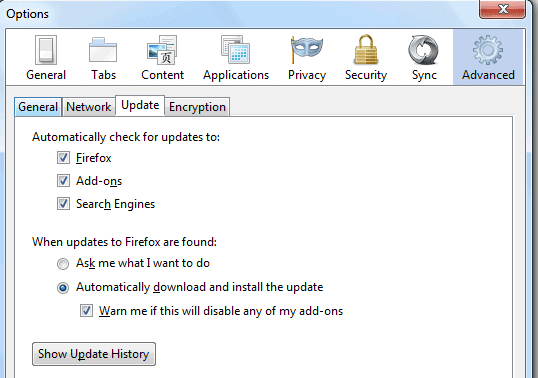Mozilla Talks Silent Updates, Plans Firefox Service

One of the issues that I hear over and over again when I talk with other Firefox users about the rapid release process is that users are tired of updating the browser every six weeks, and especially so if the update turns out to be another "under-the-hood" update where no changes can be spotted right away.
Another common complaint is add-on compatibility, and here in particular the problem that add-ons may be considered incompatible by the web browser whenever a new version of it gets released by Mozilla.
Brian Bondy addressed one of the issues in a post entitled "Mozilla Firefox and silent updates" on his personal blog. In it he mentions that Windows' User Account Control is a minor annoyance for Firefox users considering that the prompt will be displayed whenever the web browser is updated.
His plan is to find a way to bypass UAC prompts during updates after it has become clear that the user has enough permissions on the system to install and update the web browser.
Mozilla is currently experimenting with a Windows service approach. According to Brian, the Mozilla Application Updater service would be an "optional component" that users of the browser could install to automate the "software update process better".

Those of you who follow the development of the Chrome browser may now think that this is exactly what Google is doing to update its web browser. And while both techniques have similarities on first glance, there are fundamental differences under the hood. The Firefox service for one is an optional component which Firefox users can uninstall or disable at any time. Firefox will receive updates in the future even with the service uninstalled, stopped or disabled. The browser will simply switch to the old way of updating.
Mozilla tries to tackle the frequent update fatigue issue from other angles as well. The organization plans to make add-ons default to compatible during updates in the first quarter of 2012. This basically means that Firefox will no longer assume that add-ons do not work with an updated version of the browser.
The benefit here is that fewer users will see the update prompt. Firefox for some time now downloads new versions of the web browser in the background and will install them as well unless add-ons are found to be incompatible. This can be changed under Firefox Options > Advanced Update.

Other methods include showing the What's New page less frequently, increasing the time it takes before users receive notifications that an update has been downloaded and needs to be installed and to apply updates on shutdown.
If you read the comments under Brian's post you will notice that nothing's set into stone yet. The basic idea behind all proposals and plans is to make the updating process more comfortable to the user.
What's your take on the development? Would you install a Firefox service on Windows for the updating of the browser?
Advertisement



















I think the best way that Mozilla can implement this is to have Firefox check for updates every time the browser is loaded. You could have the check happen in the same way that there is the option “Always check to see if Firefox is the default browser on startup.”
When I check manually by going Help > About Firefox the checking process takes no more than about 5 seconds if there is no update.
If there is a download I have never known it to take longer than about a minute, most of the time a lot less.
Then you simply have the update ready to be installed when the browser is next closed or opened, whichever.
It seems that the only thing that is really annoying users is add-on compatibility. Once that is sorted out many more people who are stuck on 3.6, 4.0 and 5.0 will get the browser up to date.
The rest of the browser with memory management, startup times and javascript performance is improving at a decent rate.
Exposing add-on performance will be good as well because then people won’t always blame Firefox for being slow, they can correctly apportion blame to the dreadful add-ons that they have running.
> I used to like Firefox, but come on! An “update serviceâ€
Google Chrome does the same thing. So do a lot of other companies.
Mozilla really managed to destroy Firefox as much as possible :-(
I used to like Firefox, but come on! An “update service” and a new major version of Firefox every 6 weeks… Too bad Mozilla, too bad
@Paul(us)
That’s a good question. Perhaps it’s even an issue that hasn’t been considered. You should post it here.
http://www.brianbondy.com/blog/id/125/mozilla-firefox-and-silent-updates
There are plans to make add-ons compatible by default starting with Firefox 10.
There will be exceptions. Also, the most popular add-ons (Adblock Plus, NoScript, etc) are always ready for the newest Firefox release.
https://wiki.mozilla.org/Features/Add-ons/Add-ons_Default_to_Compatible
probably is the best for the people who dont stop complain about that..
Why Firefix users complain so much when Chrome is updated weekly (dev, beta) and may times twice per week ?
Awww. Another service! This can perfectly be done while FireFox is open. And automatically installed when you close the browser for ex.
Or indeed as Anthony says, a scheduled task.
Instead of opening up security holes, maybe they should focus on making the updates actually worthwhile…you know, like they were when it was 1-2 times a year?
Would you install a Firefox service on Windows for the updating of the browser?
————-
[roflol] Not bloody likely!
Martin,
The link to Brian Bondy’s blog leads here:
http://de.wikipedia.org/wiki/Drahtlose_Energie%C3%BCbertragung
Was this what you meant to link to?
http://www.brianbondy.com/
RD Thanks for letting me know, I have altered the link. This was actually Chrome’s fault. Even though Brian’s site was displayed in the browser, it showed that url (even after reloads).
A service? A constantly running bit of code to do nothing more then check for, download, and install updates? Ugh. This is what Scheduled Tasks are for!
Also, decoupling the add-on API version from the browser version would go a long way towards fixing the problem with add-ons. It made sense back when major releases were closer to a year apart than a month and releases really did break compatibility badly, but it’s just a pain for everyone involved now.
I often start-up main computer and Mozilla Firefox and wander away to do main things so main question is: For how long those the warning message appere that main new updates are, not compatible with (any of) main add-on(‘s)? Is there a disappearing warning or do I get the change to click to confirm that i noticed that there not compatible? Main preference is that I have to click to confirm, is this going to happen?
I’m not sure how they will handle this. My guess would be that they have a database with compatible add-ons and use those information to determine that. Basically, if it is listed as an add-on over at mozilla, it is compatible automatically. Then again, I may be totally off here.